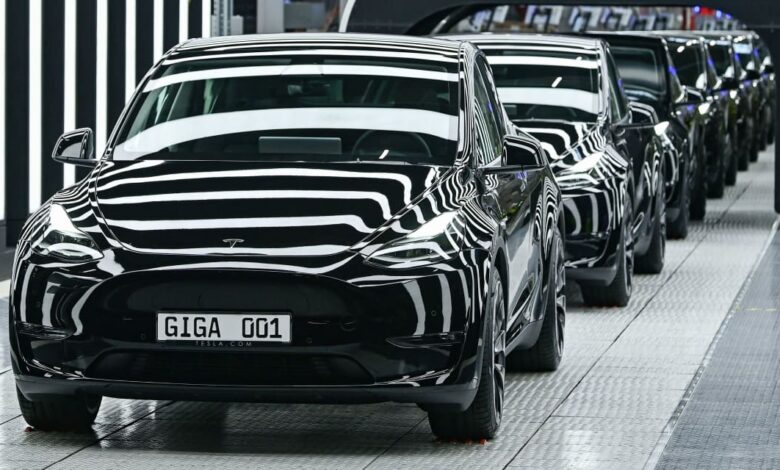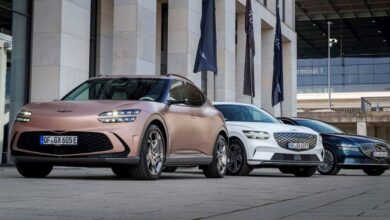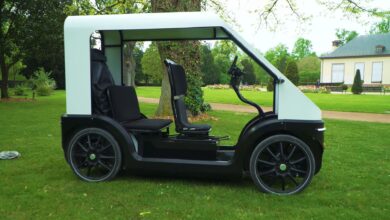Tesla, EVs Have a Trump Problem. It’s Fixable.

Tesla
,
and electric vehicles in general, have a political problem. That’s the bad news. The good news is that it’s fixable, as long as the industry acts now, abandons its passive “things will be fine in time” approach for a more-aggressive stance.
Like it or not, EVs in America are political. A 2023 poll conducted by Pew Research Center showed that only 20% of Republican car buyers would consider a BEV, while roughly 70% of Democrat car buyers would. A poll The Wall Street Journal conducted in May found that 61% of conservative respondents had an unfavorable view of EVs while 66% of liberal respondents had a favorable view.
Tesla can’t continue to grow if only Democrats buy all-electric cars. What’s more,
and
can’t reach their profit targets by selling one type of vehicle to half of the country and another type to the other half.
The auto industry’s response to the current conundrum is to put its collective head in the sand. Most executives, when asked, consistently express a belief that political problems will fade away when more-affordable EVs are on the market and charging infrastructure improves. At that point, people will buy the vehicle with the lowest cost of ownership that meets their needs.
”Customers are going to decide what kind of vehicle they buy from Ford,” said CEO Jim Farley in September. “As they already do, not [because of] all these people politicizing EVs.”
Advertisement – Scroll to Continue
“We are a non-political company,”
of America CEO Pablo Di Si told Barron’s in a recent interview. “We play within the rules.”
It sounds reasonable, but executives are missing something they should already know about the car business. As Ted Cannis, CEO of the Ford Pro unit, pointed out to Barron’s in a recent interview, cars are emotional purchases. No one needs a 500-plus luxury sedan to complete their morning commute. The current political problems can have long-lasting sales impacts.
The industry has a bigger problem than it realizes.
Advertisement – Scroll to Continue
For proof, look no further than President Donald Trump, the one leading the charge against EVs. His Christmas post on Truth Social included the line “all-electric car lunacy” when discussing things wrong in America. He’s also vowed to repeal the EV-purchase tax credits passed as part of the Inflation Reduction Act.
That would raise the effective price of already expensive EVs by about 7% or $3,800. The tax credit, of course, is $7,500, but only 23 EVs qualify for the full credit, and there are more than 50 EV models on sale.
The average EV currently costs about $54,000, before any credits, about $7,000 more than the average car. More affordable EV models are coming. A $35,000 Chevy Equinox ships later this year. Tesla plans to sell a $25,000 EV in the U.S. in early 2025.
Advertisement – Scroll to Continue
“You can be loyal to American labor or loyal to environmental lunatics. You can’t be loyal to both,” Trump said in September, during the United Auto Workers strike against the Detroit Three auto makers.
Trump’s statements are tinged with election politics. Labor’s vote in 2024 will be critical for either Presidential candidate. Trump lost Michigan in 2020 by less than 3 percentage points. Today, Real Clear Polling has Trump ahead of Biden in Michigan by half a percentage point.
It’s time for the auto industry to embrace the 2024 election realities and work on shifting perception toward “EVs are good for all, not just the environment.”
Most obviously, there is the jobs argument. EVs are adding to UAW and manufacturing employment. “There are over 50 factories being built across the U.S. It’s a boom,” says Volkswagen’s Di Si. Many are located in typically red states including Tennessee, Kentucky, Georgia, Alabama, and others. Some are in Ohio and Michigan, too. “The Inflation Reduction Act is a great piece of legislation” for American manufacturing.
Advertisement – Scroll to Continue
“It’s about building out infrastructure in more states,” says Wedbush analyst Dan Ives, adding the industry needs to work in the “202” area code. That’s Washington D.C.
Auto executives can suggest realistic modifications and adjustments to enhance existing laws. Prior to the 2020 election, Trump threatened to withdraw from the North American Free Trade Agreement. Eventually, NAFTA morphed into the USMCA. The new deal included different content-sourcing requirements for cars, a benefit to domestic manufacturers. Free trade survived, and Trump made good on a promise.
The final thing the auto industry can do is produce those cheaper EVs, while improving battery technology, charging times, and charging infrastructure. China, where vehicles that plug in can account for 50% of total sales in a given week, has roughly 15 times the number of public chargers than the U.S.
Those are steps the industry is already doing. They are the least important piece of the puzzle for 2024 and 2025. For now, do the politics.
Write to Al Root at allen.root@dowjones.com



